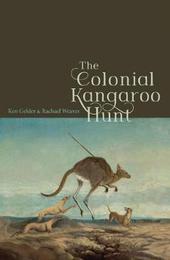
|
The Colonial Kangaroo Hunt
Paperback / softback
Main Details
| Title |
The Colonial Kangaroo Hunt
|
| Authors and Contributors |
By (author) Ken Gelder
|
|
By (author) Rachael Weaver
|
| Physical Properties |
| Format:Paperback / softback | | Pages:229 | | Dimensions(mm): Height 232,Width 154 |
|
| Category/Genre | Australia, New Zealand & Pacific history |
|---|
| ISBN/Barcode |
9780522875850
|
| Classifications | Dewey:338.372922 |
|---|
| Audience | |
|---|
|
Publishing Details |
| Publisher |
Melbourne University Press
|
| Imprint |
The Miegunyah Press
|
| Publication Date |
3 March 2020 |
| Publication Country |
Australia
|
Description
From the arrival of Captain James Cook in 1770 to classic children's tale Dot and the Kangaroo, Ken Gelder and Rachael Weaver examine hunting narratives in novels, visual art and memoirs to discover how the kangaroo became a favourite quarry, a relished food source, an object of scientific fascination, and a source of violent conflict between settlers and Aboriginal people. The kangaroo hunt worked as a rite of passage and an expression of settler domination over native species and land. But it also enabled settlers to begin to comprehend the complexity of bush ecology, raising early concerns about species extinction and the need for conservation and the preservation of habitat.
Author Biography
Ken Gelder is a Professor of English at the University of Melbourne. His books include Uncanny Australia- Sacredness and Identity in a Postcolonial Nation (1998, with Jane M Jacobs), Popular Fiction- The Logics and Practices of a Literary Field (2004), Subcultures- Cultural Histories and Social Practice (2007) and After the Celebration- Australian Fiction 1989-2007 (2009, with Paul Salzman). Rachael Weaver is an ARC Senior Research Fellow in English and Theatre Studies at the University of Melbourne. She is the author of The Criminal of the Century (2006) and, with Ken Gelder, The Colonial Journals- and the Emergence of Australian Literary Culture (2014) and Colonial Australian Fiction- Character Types, Social Formations and the Colonial Economy (2017).
|